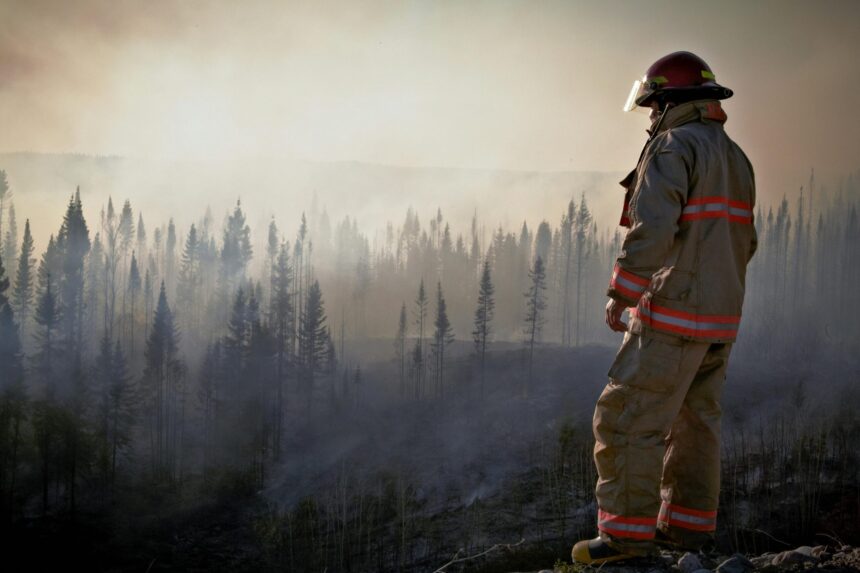Greece is continuing to fight five major wildfires across the country, as it endures a punishing heatwave with temperatures expected to climb as high as 44°C (111.2°F) on Sunday. Firefighters are currently focusing their efforts on two major blazes on the islands of Kythira and Evia, with extreme heat and strong winds fuelling dangerous conditions.
According to fire brigade spokesperson Vasilios Vathrakoyannis, the situation had improved somewhat following an “all-night battle” against the flames. However, he warned on Sunday that the risk of fresh outbreaks remained “extremely dangerous.”
Neighbouring Turkey, meanwhile, has recorded its highest-ever temperature, as fires rage in several regions of the country. The environment ministry reported that a reading of 50.5°C was recorded in the south-eastern city of Silopi, surpassing the country’s previous record of 49.5°C.
Greece’s Climate Crisis and Civil Protection Minister, Giannis Kefalogiannis, acknowledged the human and environmental toll of the ongoing crisis. “We have injured firefighters, human lives were put at risk, properties have been burned, and forest areas have been destroyed,” he said.
High winds continued to stoke the flames across Greece on Sunday. In response, the country formally requested assistance from the European Union’s Civil Protection Mechanism, seeking six firefighting aircraft to bolster the local effort.
On Kythira, a fire that broke out in the village of Pitsinades on Saturday morning quickly spread, affecting an estimated 20% of the island’s land area. Evacuation alerts were issued on Sunday, urging residents of several villages to leave immediately.
By dawn, flare-ups were still being fought on the island, with helicopters and two water-bombing aircraft supporting firefighters on the ground.
Over on Evia, another wildfire near the village of Pissona spiralled “out of control” on Saturday. Six firefighters were taken to hospital for treatment due to burns and smoke inhalation. Several villages were left without electricity as the blaze swept through the area. Local officials reported some signs of improvement by Sunday, but warned that high winds continued to pose a serious risk of flare-ups.
In Messinia, a third major fire ignited in the Polithea area of Trifylia early Saturday and grew in intensity later in the day. Authorities reported significant destruction of homes and agricultural land. As of Sunday, 100 firefighters were working to contain the flames in Messinia, while 67 were deployed to the Kythira blaze.
In the Attica region, which includes the capital Athens, a fire that erupted in Afidnes on Saturday spread rapidly through Drosopigi, Kryoneri, and Agios Stefanos, prompting evacuations. While officials say the fire’s main front has been contained, numerous hotspots continue to burn. Smoke and the scent of burning wood reached central Athens, as Greece continued to appeal for EU assistance to tackle the fires.
Elsewhere, in the Chania region of Crete, firefighters are confronting a 20-kilometre wildfire front. The blaze has already swept through forests, destroyed beehives, and decimated crops and livestock. Strong southwesterly winds are hampering containment efforts, and power outages remain in effect across several villages.
Last month, wildfires on Chios—Greece’s fifth-largest island—destroyed around 4,700 hectares (11,600 acres) of land. Earlier in July, a wildfire in Crete forced the evacuation of 5,000 tourists as flames approached populated areas.
Meanwhile in Turkey, firefighters are contending with multiple blazes across several provinces. In Karabuk, a northern region, crews have been locked in a four-day battle against a large wildfire, according to AFP. In Eskisehir province in the northwest, ten people died while fighting fires last Wednesday.
In response to the extreme temperatures and escalating fires, several Turkish municipalities have introduced water restrictions. Among them is the resort town of Cesme, located on the country’s west coast.
The severe wildfires and intense heat gripping the eastern Mediterranean are being closely linked by scientists to climate change. Experts warn that rising global temperatures are making such events more frequent and more destructive. Greece, Turkey, and other parts of southern Europe continue to face mounting pressure to adapt to and mitigate the accelerating effects of the climate crisis.






